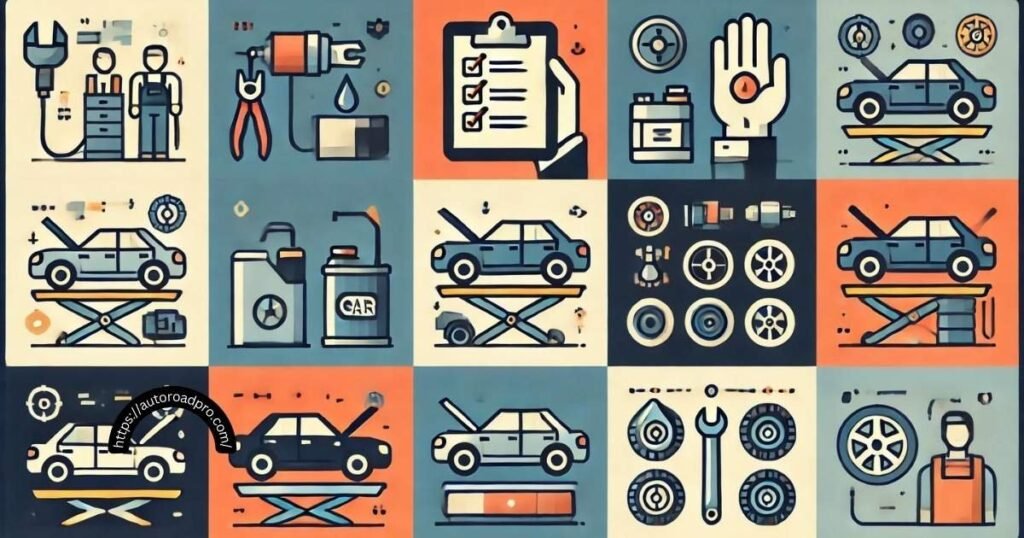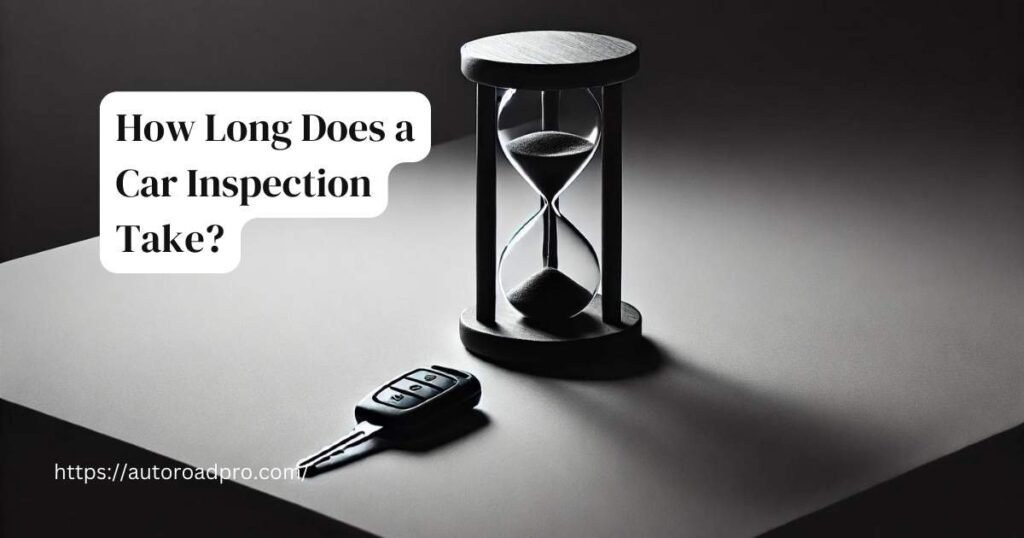Car inspections usually last between 30 minutes to an hour. However, this can change based on a few things. These include the rules of the state or country, how well your car is working, and how fast the inspection station works. If your car is in good shape and you have all the right papers, the inspection often goes quickly.
Sometimes, when you need a very detailed check, like before buying a car, it might take up to two hours.
Table of Contents
What is the purpose of a car inspection?
Car inspections are really important. They help make sure that cars are safe to drive and that they don’t harm the environment too much.
When cars get checked, mechanics look at the safety parts and the systems that control pollution to find any problems that might need fixing.
What are the different types of car inspections?
Safety inspections check that the car’s key safety features, like brakes, lights, tires, and steering, work well.
Emissions inspections look at the car’s exhaust system to make sure it meets environmental emission standards.
Pre-purchase inspections are detailed checks done before you buy a used car to find any problems.
Some states require annual or biennial inspections to keep up with safety and emissions rules.
What factors influence the duration of a car inspection?
The time it takes to inspect a car can vary based on several factors:
- Type of Inspection: The type of inspection significantly impacts the duration. For instance, emissions tests are quick, focusing only on exhaust emissions. Safety inspections, however, are more comprehensive and include checks on:
- Lights: Inspect headlights, taillights, brake lights, turn signals, and hazard lights.
- Brakes: Evaluating functionality and pedal feel.
- Steering and Suspension: Checking tightness and responsiveness.
- Tires: Inspecting tread depth and overall condition.
- Fluid Levels: Checking engine oil, brake fluid, and coolant levels.
- Windshield: Examining for cracks and chips, noting size and location.
- Seatbelts: Verifying functionality and retractability.
- Horn: Testing functionality.
- Vehicle Condition: Older or poorly maintained vehicles may require more time for a thorough evaluation.
- Inspector’s Experience: More skilled and experienced mechanics can often perform inspections more efficiently.
- State Regulations: Different states have different inspection requirements, which can affect how long the process takes.
Additional factors include:
- Vehicle’s Emission System Thoroughness: In areas with stricter emission regulations, the testing process is more comprehensive and takes longer.
- Brake Testing: The method of brake testing varies by shop. Some use a dynamometer for a detailed assessment, while others may do a simple visual check and a test drive.
- Tire Play: Worn or damaged tires often require extra scrutiny, potentially prolonging the inspection process.

How does the type of inspection affect the time required?
Safety inspections usually last between 20 to 45 minutes. They check important parts like brakes and lights.
Emissions tests are quicker, taking about 15 to 30 minutes. If you get a comprehensive inspection, which includes both safety and emissions, it could take from 45 minutes up to several hours.
How long does a standard safety inspection take?
A standard safety inspection lasts between 30 and 45 minutes. We check your car’s brakes, lights, tires, and steering during this time to make sure everything works right.
What is the typical duration of an emissions test?
An emissions test generally takes about 15 to 30 minutes. This test checks the pollution your car’s exhaust emits to see if it meets environmental standards.
How much time is required for a comprehensive vehicle inspection?
A full vehicle inspection, which includes checking both safety and emissions, can take between 45 minutes and two hours.
The time needed depends on how your vehicle is doing and how detailed the inspection is.
Why Is the Vehicle’s Emission System Thoroughly Checked?
We check the vehicle’s emission system to make sure it meets environmental standards.
This test reduces harmful pollutants in the air, which helps keep the air clean and everyone healthier.
During the test, we look for leaks in the exhaust system and measure how much pollution the car releases.
How Are the Brakes Tested During an Inspection?
To test the brakes, we check the brake pads, rotors, and fluid levels. We also look for any wear or damage.
Sometimes, we do a brake performance test to make sure the car can stop quickly and safely.
What Role Do Tires Play in Car Inspection Outcomes?
Tires are very important for a car inspection because they keep you safe on the road. We check the tread depth, tire pressure, and the overall condition of the tires.
If the tires are worn or damaged, the car might not pass the inspection since bad tires can lead to accidents.
What are the key components checked during a car inspection?
Car inspections involve checking various components to ensure the vehicle is safe and meets regulations.
What parts of the car are checked for safety compliance?
Inspectors check brakes for wear and function. They ensure headlights, tail lights, turn signals, and brake lights are working.
Tires are examined for tread depth and condition. Steering and suspension are tested to ensure proper control and stability.
All seat belts must function correctly, and mirrors should be intact and well-positioned.
What aspects of the suspension system are examined?
Inspectors check the suspension system for leaks, damage, and wear. They make sure the vehicle provides a stable and smooth ride.
What electrical systems are tested in a car inspection?
Electrical systems, including lights, indicators, and electronic controls, are tested to ensure proper function. Inspectors also look for any warning lights on the dashboard that might signal underlying issues.
What Documents Should You Bring to a Car Inspection?
When you go for a car inspection, make sure you have these items:
- Vehicle Registration: This shows that your vehicle is legally registered.
- Proof of Insurance: This proves that your vehicle is insured.
- Driver’s License: This confirms your identity.
- Previous Inspection Reports: Bring these if you have them. They show the history of past inspections.
Why Is Proof of Insurance Necessary for a Car Inspection?
You need proof of insurance for a car inspection to show that your vehicle is legally insured. This is important because it covers any damages or accidents involving your vehicle.
How Does the Vehicle Registration Affect the Inspection Process?
Vehicle registration is important for the inspection process because it proves your vehicle is legally recognized. Inspectors use it to make sure everything is up to date and matches your vehicle’s details.
How Can You Prepare Your Vehicle for Inspection?
To prepare your vehicle for inspection, check all the lights to ensure they work, including the headlights, brake lights, and indicators.
Next, inspect the tires to verify that the pressure is right and the tread depth is sufficient. Also, make sure all fluids like oil, brake fluid, and coolant are at the proper levels.
Lastly, give your vehicle a good cleaning to help inspectors see all components clearly.
What Pre-Inspection Checks Can Speed Up the Process?
To speed up the vehicle inspection process, perform pre-inspection checks. This includes checking all lights, inspecting the tires, ensuring the windshield wipers function properly, and topping up all fluids. Addressing these issues beforehand can help avoid delays during the inspection.
Why Is Cleaning Your Vehicle Important Before an Inspection?
Cleaning your vehicle before an inspection is crucial. It helps the inspectors see all parts of your vehicle without obstructions.
If your car is dirty, it can hide problems that need to be addressed, making it difficult to accurately assess the vehicle’s condition.
What Common Issues Can Cause a Car to Fail Inspection?
Several issues can cause a car to fail an inspection. These include worn tires, brake problems like worn pads or damaged rotors, faulty lights such as non-functioning headlights or indicators, excessive emissions, and windshield cracks that impair visibility or structural integrity.
How Can Lighting Issues Affect Your Car’s Inspection Results?
Lighting issues can greatly affect your car’s inspection results. If headlights, taillights, brake lights, or indicators are not functioning, it might cause your vehicle to fail the inspection.
Proper lighting is essential for safe driving, particularly in poor visibility conditions.
What Impact Do Windshield Cracks Have on Inspection?
Windshield cracks can significantly impact your inspection. If they impair the driver’s visibility or affect the vehicle’s structural integrity, your car is likely to fail the inspection.
It’s important to address such issues by repairing or replacing the windshield before the inspection.
Conclusion
Regular car inspections keep your vehicle safe and meet legal rules. They spot problems early, avoiding expensive fixes and helping your car last longer and run better.
Knowing the car inspection process helps you prepare better. This way, the inspection goes faster and smoother. Always fix any known issues before the inspection to help your car pass and stay in great shape.
FAQs
Can you drive your car if it fails inspection?
In most states, you cannot legally drive a car that has failed inspection until the necessary repairs are made and the vehicle passes a re-inspection.
How often should you get your car inspected?
The frequency of inspections depends on state regulations. Some states require annual inspections, while others may have biennial or more specific requirements.
What are the costs associated with a car inspection?
The cost of a car inspection can vary based on the type of inspection and your location. Safety and emissions tests typically have set fees, while pre-purchase inspections might be more expensive due to their comprehensive nature.
Where Should You Go for a Reliable Car Inspection?
For a reliable car inspection, you might want to visit an authorized dealer, a reputable independent garage, or a state-operated inspection station. Authorized dealers have trained technicians and access to the latest tools. Independent garages offer personalized services and competitive prices.
How to Choose the Right Inspection Center?
When choosing the right inspection center, consider its reputation and certifications. Make sure the center is convenient for you and offers comprehensive services.
What Are the Benefits of Going to an Authorized Dealer for Inspection?
Visiting an authorized dealer for your car’s inspection comes with perks. They have experts who know your car’s brand well and use the latest tools and genuine parts. Plus, you’ll get a detailed report and advice on any needed repairs.
What Are the Next Steps After a Car Inspection?
After your car is inspected, you’ll get a report. If your car passes, you’ll get a sticker or certificate. If it fails, the report will show what needs fixing. You’ll have to fix these issues and then get your car checked again.
What to Do If Your Car Fails the Inspection?
If your car doesn’t pass the inspection, check the report to understand the problems. Get these fixed and then take your car back for another inspection to make sure everything’s now up to standard.
How Often Should You Reinspect Your Car After Initial Approval?
How often you need to reinspect your car depends on where you live. Usually, you need a car inspection every year or two.
If your car was in an accident or you’ve made big changes to it, you might need to check it more often. Always follow local laws to make sure your car stays compliant.


